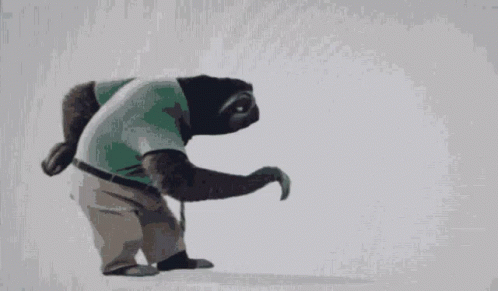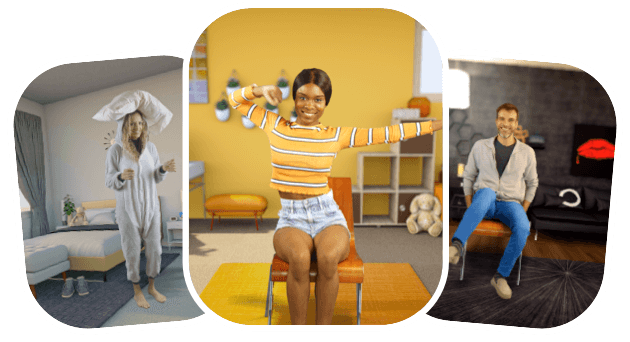Believe it or not, sleep and how you feel each day as you gear up for work is lots like the chicken and the egg. Yup, which comes first? Is it that work stressors keep you awake, or that a lousy night’s sleep creates a foggy brain drain? Maybe it’s worth considering that the answer is simple. Both!
Okay, there it is. Another vicious cycle that messes with your workday. Plus, one more reason to avoid your desk and the glaring stare of a blank computer screen. No wonder you (only sometimes) hate working from home.

Wakeout hears your gloom across the cybersphere! That’s why we’re here. To share ‘sleep well’ ideas we’ve picked up on. We’re gathering wellness goodies that complement living and working healthfully. That’s one reason our team has designed a neat and easy Sound Sleep Checklist for busy people like you!
Sleep Science Scuttlebutt
A lot of research attention is focused on sleep. There are many reasons why this is the case, especially considering that a good amount of sleep is necessary for overall health and functioning. Plain and simple: Being sleep-deprived puts lots of people at risk for all kinds of issues - affecting both physical and mental health.
A Sleep Deprived Population

Let’s face it, there’s a lot of sleep-deprived people walking around out there. The Centers for Disease Control and Prevention estimates that a third of adults in the U.S. don’t get enough sleep. That’s 33% of us as we work in all kinds of critical roles!
If that weren’t enough, the sleep science reporting gets worse: Sleep deprivation is linked with depression, heart disease, stroke and immune system troubles. Added to that, not having enough sleep can disrupt attention, concentration, and decision-making.
Issues like these demand attention. For instance, being sleep deprived and drowsy leads to accidents, resulting in car crashes, falls, and an array of injuries and mistakes. Heck, dozing off while writing a critical report or paper can spell employment or educational disaster. Wakeout doesn’t want any of this to happen to you!
5 Good Reasons For Getting Enough Sleep
“Early to bed and early to rise, makes a man healthy, wealthy, and wise.”
What's so important about sleep? Wakeout wants you to have the inside scoop on how sleep (at least enough of it) makes work more interesting and productive. Really, it’s true. To get the full impact of that info, it helps to know some candid info about the effects of not getting enough ZZZZs.
Sure, sleep needs vary from one person to the next. Despite that, there’s such a thing as the amount that promotes health and a parcel of other benefits. Those include being creative, having power-packed productivity, and facing the day with an upbeat mood.
Magical Healthy Sleep Number: 7!
The recommendation is to get a minimum of 7 hours of sleep. Along with the bunch of sweet work outcomes, you’ll gain in these healthy ways:
- Less chance of becoming overweight or obese, related to an imbalance of the hormones that prompt hunger signals.
- A greater likelihood of retaining muscle mass when losing weight or striving for more balanced body composition.
- Improved immune system responses, lessening the risk of inflammation. This means there's a reduced chance of a host of chronic illnesses, such as arthritis, diabetes, and circulatory troubles.
- Sleeping well enough that stressors don’t bother as much, protecting you from fright-or-flight reactivity and the rattling quakes of adrenaline.
- You’re more apt to enjoy a balanced mood while avoiding depression and becoming emotionally sensitive.
Sleep-Check Yourself: An innocent yawn or a gasp for more sleep?

Recognizing the signs of the lack of quality sleep is not rocket science. How in the world could zombie-mode takeover slip past our gotcha radars, right? Even if we somehow fail to notice we’re 3 hours (sorry, a month) short of a proper amount of sleep, others are sure to let us know. Who, us? Naw, we don’t have any temper issues going on. Right? Then again…
The numbers don’t lie. One in three of us either ignores, or is completely unaware, of sleep deprivation signs, particularly these:
- Sleepiness and lack of energy
- Repetitive yawns
- Mood swings and irritability
- Slowed thinking and low attention span
- Memory problems
- Frequent mind-wandering
The key point here is: We’re after sleep quality. More than lying in bed, tossing and turning part of the 7-8 hours of ‘sleep’ a night. That oft-quoted mantra of needing “8 hours of sleep” can delude you into thinking you’ve got the sleep quota covered. The sleep window varies among individuals and different age groups. See the sleep duration recommendation for your age group.
If the quality is meager, your sleep-deprived body will ultimately push the pressing question: “What the heck is wrong with me?”
Well, most likely, nothing. Maybe it’s just an issue with your sleep setup’s effect on your ability to get a healthy dose of sound sleep.
Rest Easy With These 5 Sleep Setup Essentials

While it may seem like a set bedtime and sleeping pills are the only things we have control over, they’re not. Even those sleep balms can get disrupted (thank toddlers, noisy neighbors, and a host of long-term issues).
That’s where there's a mattress-sized-load of science-backed stuff for tweaking our daily schedules. Each tidbit of info can add a refreshing boost to your self-designed sleep portfolio.
Meet the sleep health essentials! The factors that layer like blanket over sheet, or a duvet’s cover and insert. These essentials are designed to enhance your ability to sleep well throughout the night. Take time, try out those that grab your attention, and watch your progress. After all, you’re developing a new habit and that can take time and patience.
#1 Temperature–Keep it Cool
Just a bit too hot, and you'll half-consciously toss and turn; too cold, and that's when you wrap yourself in blankets, becoming a human burrito–ready to hibernate. As reported by the National Sleep Foundation and Journal of Clinical Sleep Medicine, temperature plays a big role in setting you up for a peaceful slumber and during sleep.
Then, a spike in temperature in the morning triggers awesome biological trickery that gets you out of bed. Increases in body temperature in a healthy adult cause cortisol levels to spike and your metabolism to fire into gear. This means if you get up synchronously with that spike, you’ll skip right past those waking-up groggy spirits.
#2 Light–Dim It Down to Sleep
Light triggers neurons (intrinsically photosensitive melopsin cells) in your eyes that send signals throughout the body. Now, you might be saying "wait, what the blurb?” Well, two things happen when this occurs: Your whole body awakens, which is super helpful if you need to get up and work or have a life. This same light action also puts a timer in motion–once the time runs out, you’re bound to fall back to sleep. Oops!
#3 Nutrition–Timing Is Everything
Food can support or sabotage a good night's sleep. Even some healthful foods can be culprits. When considering the effects of food on sleep, two factors play a major role: What you eat and when you eat.
This becomes obvious when eating high-fat, greasy, highly seasoned meals, and ickily sweet desserts right before bedtime. These create no-no nighty-night scenarios. Getting your food in order is a better first step you need to take before considering any sleep medicine.
#4 Physical Activity–Sleep’s Perfect Partner
The movement goes beyond just burning calories and bounding forth like an ecstatic horse.
When you're on the active side of daily life, your metabolism speeds up. You digest food faster, which in turn helps you be more alert throughout the day. Quite a positive chain of events, isn’t it?
Plus, exercise - even a brief one - increases your core body temperature which can help keep you awake – then, later on, you’ll be tired enough to fall asleep faster.
#5 Supplements–Extra Sleep Health Support
For most people, having four out of five of the sleep essentials taken care of aids better sleep. However, if you’re having trouble putting everything in order, or have a sleep disorder, you might wish to have the right supplements on hand. Try it out, maybe sleep medicine turns out an unnecessary surplus.
Today, we’re lucky to have stacked up evidence that can help us pick the right supplements for our own needs.
4 Research-Type Tips to Help You Sleep Like a Log

We’ve done the informational heavy lifting so you can focus on drifting off to peaceful sleep.
Tip #1: Improve Your Wake-up Routine
Your sleep cycle starts the moment you wake up! Well, how many hours before sleep is that?
No, no, we’re not referring to the snooze cycle so many indulge in time and again. We’re saying that a good morning routine sets circadian rhythms and plants the seeds for those deep nighty-night states. Here’s what’s up!
Remember the two sleep essentials - light and temperature? They carry tremendous importance in setting your internal bodily clock, tip-top Swiss-style, fueling you with well-needed daily alertness:
Always wake up around the same time - plan 30-to-45-minute variations depending on when you hit the sack the night before. Most of all, avoid snoozing your alarm clock - especially young adults who more prone to this delay. It just keeps you in the snooze-on rut.
View natural bright lights - do so within 30 to 60 minutes from the moment you wake up for at least 10 minutes. The key is to get direct natural light, as suggested by the Academy of Sleep Medicine. Starting your day outside, without your eye shades, boosts sleep ability hours later. If the sun doesn’t match your early-bird schedule, viewing artificial LED lights (e.g. ring lights) can activate your circadian rhythm.
Raise your body temperature - get outdoors, walk your dogs, do a morning pajama dance or engage in light physical activity. Cold showers also trigger your inner thermostat to raise your core temperature.
Tip #2: Set Up a Restful Sleep Environment
Going to bed on time and getting a good amount of sleep is not enough - it's important to create a conducive sleep environment in order to get the best shut-eye possible. It’s time to take charge of your bed zone! Make sure everything is just so, whether that’s being extra picky about the wrinkles in your sheets or avoiding any kind of clutter around your sleep space. Also, this small checklist could come in handy.
Set your thermostat to a cool room temperature - 60 to 68 degrees Fahrenheit (15 to 20 degree Celsius) is perfect.
- Get a medium-firm mattress to promote comfort and spinal alignment.
- Avoid viewing blue-light emitting, electronic devices, or reading with lights on, all of which suppress your melatonin, sleep-aid secretion.
- Roll down your blinds and keep the room dark, avoiding any artificial light. Use an eye mask if need be.
- Reduce nocturnal noise and mute your phones as these can disrupt your sleep cycle and thus sleep quality. Read more at the Academy of Sleep Medicine.
- Fill your sleep environment with soothing fragrances such as lavender oil, chamomile, bergamot, and others, delivered via diffuser, lotion, or a relaxing bath.
- Keep your bedroom clean and free of clutter.
Tip #3: Maintain a Healthy Diet

Remember, it’s not just what you eat before bedtime. It’s what you eat throughout the day and week that determines your sleep health. Scientists report that food choices throughout the day affect sleep. A diet of less fiber, with more sugary food and saturated fats, is linked with lower-quality sleep.
After scrutinizing multiple studies, we learned that the sleep-diet relationship thrives on can-do and constraints. It’s important to know the foods to eat and those to avoid, all while steering clear of overeating or sticking religiously to a certain diet.
Here’s a little nutri-list to help you nourish this relationship:
Bottom line, to state the obvious, is it’s best to skip a late-night meal completely. Eating any sort of food triggers digestion which takes an average of about 2.5 to 3 hours to settle. This means that all those luscious gastronomic delights are likely to impose on your rest with unfinished business.
Tip #4: Relaxation techniques to help you fall asleep faster
Stress and anxiety can wreak havoc on your sleep. For most people, wandering off into an excess-thinking land is why it’s hard to fall asleep.
To stay on track with a consistent sleep schedule you want to engage in activities that help with slowing your heart rate. Although there are many tools to pick, it’s wise to stick to those that help you fall asleep faster.
Physiological sigh - a breathing technique proven to bring an instant soothing effect to your mind and body. By taking two consecutive inhales and breathing out slowly you are able to relieve stress even after a single go.
Belly (diaphragmatic) breathing - sit comfortably with your back straight, place one hand on your stomach and one hand on your chest. Take in slow deep breaths, making sure to focus on feeling your belly expand as you inhale and compress as you exhale.
Yoga Nidra - or any form of guided meditation or hypnosis should help you relax and ease you off to sleep. Pull out your headphones, search for any form of guided meditation you prefer, and let the gentle voice ooze you on to nap-nap land.
Light reading - Grab a super easy-read or your favorite sci-fi novel. Observe as the rows and words are mixing up, sedating you into a deep rest.
Light workout before bed - Can help you reduce stress, relax, and ease you into your warm sheets free of tension.
Important Notice
While the given advice is well-researched and can support healthy sleep for a healthy adult, if you're experiencing chronic sleep troubles, first advise your family doctor.
Wakeout’s Wakefield brings you his
Top Sleep Tips in a printable PDF design.
A gift for your sweet dreams!
Wakeout




